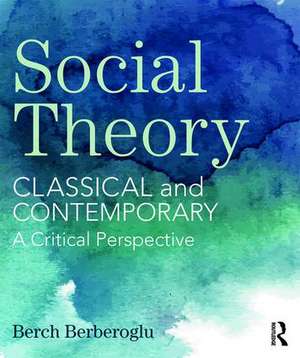Social Theory: Classical and Contemporary – A Critical Perspective
Autor Berch Berberogluen Limba Engleză Paperback – 6 ian 2017
| Toate formatele și edițiile | Preț | Express |
|---|---|---|
| Paperback (1) | 360.15 lei 6-8 săpt. | |
| Taylor & Francis – 6 ian 2017 | 360.15 lei 6-8 săpt. | |
| Hardback (1) | 991.40 lei 6-8 săpt. | |
| Taylor & Francis – 6 ian 2017 | 991.40 lei 6-8 săpt. |
Preț: 360.15 lei
Nou
Puncte Express: 540
Preț estimativ în valută:
68.92€ • 74.84$ • 57.90£
68.92€ • 74.84$ • 57.90£
Carte tipărită la comandă
Livrare economică 23 aprilie-07 mai
Preluare comenzi: 021 569.72.76
Specificații
ISBN-13: 9781138125490
ISBN-10: 1138125490
Pagini: 304
Dimensiuni: 189 x 246 x 20 mm
Greutate: 0.54 kg
Ediția:1
Editura: Taylor & Francis
Colecția Routledge
Locul publicării:Oxford, United Kingdom
ISBN-10: 1138125490
Pagini: 304
Dimensiuni: 189 x 246 x 20 mm
Greutate: 0.54 kg
Ediția:1
Editura: Taylor & Francis
Colecția Routledge
Locul publicării:Oxford, United Kingdom
Public țintă
Postgraduate and UndergraduateCuprins
Preface
Introduction
Part I: Classical Social Theory
1. Hegel on Dialectics, the State, and Society
2. Marx and Engels on Social Class and Class Struggle
3. Durkheim on Society and Social Order
4. Weber on Bureaucracy, Power, and Social Status
5. Pareto, Mosca, and Michels on Elites and Masses
6. Simmel on Social Relations and Group Affiliations
7. Cooley and Mead on Human Nature and Society
8. Freud on the Development of Society and Civilization
9. Addams and Early Women Social Theorists
10. Veblen on the Leisure Class and Conspicuous Consumption
11. Mannheim on Ideology and Utopia
12. Gramsci and Lenin on Ideology, the State, and Revolution
13. Kollontai on Class, Gender, and Patriarchy
14. Du Bois and Frazier on Race, Class, and Social Emancipation
Part II: Contemporary Social Theory
15. Parsons, Merton, and Functionalist Theory
16. Mills on the Power Elite
17. Domhoff on the Power Structure and the Governing Class
18. Althusser, Poulantzas, and Miliband on Politics and the State
19. Trimberger, Block, and Skocpol and Neo-Weberian Theorizing
20. Homans on Social Exchange
21. The Frankfurt School of Critical Theory
22. Goffman and Garfinkel on Dramaturgy, Ethnomethodology, and Everyday Life
23. Wilson and Willie on Race, Class, and Poverty
24. Feminist Theory: Yesterday and Today
25. Wallerstein and World-Systems Theory
26. Theories of Globalization
27. Therborn and Szymanski on Contemporary Marxist Theory
28. Foucault on the Diffusion of Power
29. Harvey and Callinicos on Postmodernism and Its Critique
30. Social Movements and Transformation
Conclusion
Bibliography
Index
About the Author
Introduction
Part I: Classical Social Theory
1. Hegel on Dialectics, the State, and Society
2. Marx and Engels on Social Class and Class Struggle
3. Durkheim on Society and Social Order
4. Weber on Bureaucracy, Power, and Social Status
5. Pareto, Mosca, and Michels on Elites and Masses
6. Simmel on Social Relations and Group Affiliations
7. Cooley and Mead on Human Nature and Society
8. Freud on the Development of Society and Civilization
9. Addams and Early Women Social Theorists
10. Veblen on the Leisure Class and Conspicuous Consumption
11. Mannheim on Ideology and Utopia
12. Gramsci and Lenin on Ideology, the State, and Revolution
13. Kollontai on Class, Gender, and Patriarchy
14. Du Bois and Frazier on Race, Class, and Social Emancipation
Part II: Contemporary Social Theory
15. Parsons, Merton, and Functionalist Theory
16. Mills on the Power Elite
17. Domhoff on the Power Structure and the Governing Class
18. Althusser, Poulantzas, and Miliband on Politics and the State
19. Trimberger, Block, and Skocpol and Neo-Weberian Theorizing
20. Homans on Social Exchange
21. The Frankfurt School of Critical Theory
22. Goffman and Garfinkel on Dramaturgy, Ethnomethodology, and Everyday Life
23. Wilson and Willie on Race, Class, and Poverty
24. Feminist Theory: Yesterday and Today
25. Wallerstein and World-Systems Theory
26. Theories of Globalization
27. Therborn and Szymanski on Contemporary Marxist Theory
28. Foucault on the Diffusion of Power
29. Harvey and Callinicos on Postmodernism and Its Critique
30. Social Movements and Transformation
Conclusion
Bibliography
Index
About the Author
Notă biografică
Berch Berberoglu is Professor of Sociology and Director of Graduate Studies in the Department of Sociology at the University of Nevada, Reno. His most recent books include Beyond the Global Capitalist Crisis: The World Economy in Transition (2012); Political Sociology in a Global Era (2013); and The Global Capitalist Crisis and Its Aftermath (2014).
Descriere
Social Theory provides a sophisticated yet highly accessible introduction to classical and contemporary social theories. The author’s concise presentation allows students and instructors to focus on central themes. The text lets theorists speak for themselves, presenting key passages from each theorist’s corpus, bringing theory to life. The approach allows instructors the opportunity to help students learn to unpack sometimes complex prose, just as it offers inroads to class discussion. Chapters on Addams and early feminism, on Habermas and the Frankfurt School, on Foucault, and on globalization and contemporary movements round out contemporary coverage. The book presents and explains key theories, just as it provides an introduction to central debates about them.
